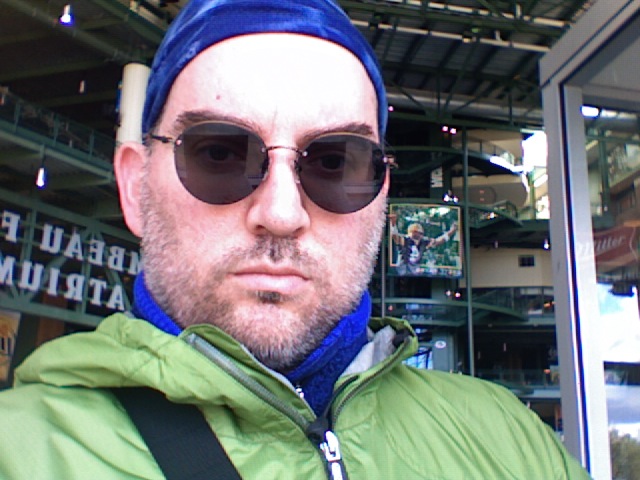So, I'm sitting here, on my sofa. The Wii is playing it's "you're ignoring me, but that's OK" music. Ember (Cat #4) is curled-up and sleeping about 8 inches from my right leg. India is doing doggy things in the backyard, through which I should be forcing a reel mower. Maple seed-pods, the color & translucency of old parchment, spin past the window, air assaulting the lawn and getting hung-up on dandelion redoubts. Nicole is upstairs in her sewing room, making something of beauty, warmth, and utility.
I'm listening to Natalie Angier's The Canon. It's a whirl-wind tour of science. Not the usual latest-developments pastiche, nor a complete history of a particular field, it's what-scientists-wished-laypeople-understood-about-science. Some examples:
The book also re-enforced the degree to which science has permeated our culture. When the toaster fails, no one in America offers sacrifice to the Toaster God so that it'll function again. Neither do we assume that it has simply stopped working, but might simply start working later, and so wait around to try again. We assume, in a way so fundamental to our thinking that we are blind to the assumption, that things happen for comprehensible reasons. So, we check to see if the toaster's not plugged-in, or confirm the darkness-o-meter isn't set for barely-warm, etc. All while talking about how we "don't get" science.
One of the things I've gotten from the book, so far, is a visualization of the electron cloud from Brian Greene. He suggests thinking of it a pixelated face. You look at, you know there are 2 eyes in there. You don't know exactly where. you only know that those 2 dark patches are the places where the eyes are most likely to be. They might be somewhere else, but that's improbable. And yet, while we don't know exactly where the electrons (or any particle, for that matter) are, they are there. They occupy a distinct location. Just like the eyes in the face behind the pixels.
Time marches. Afternoon becomes late-in-the-day, becomes tomorrow. The cat wakes. The dog digs to freedom. And I go measure the porch and try to learn if I need a permit to extend it. Ah, entropy.
I'm listening to Natalie Angier's The Canon. It's a whirl-wind tour of science. Not the usual latest-developments pastiche, nor a complete history of a particular field, it's what-scientists-wished-laypeople-understood-about-science. Some examples:
Listening to this book, I realize I learned nothing from my high school Chemistry class. Somehow, I got a C without understanding the fundamental difference between covalent and ionic bonds. I learned that, these days, most people who think about the best way to teach science have concluded that we teach it backwards. It should be Physics first, then Chemistry, then Biology. Why? Because Physics is the foundation science; and you can do easy/simple experiments that will teach the scientific method. There is no such thing as a simple Biology experiment.
- Science is a way of thinking. It is not a catalog of facts. The paramount importance of experiment is the only unchallengeable doctrine. Every scientific understanding is up for revision, reversal, or re-enforcement by experiment.
- If you're going to challenge a well-established Theory (e.g., Evolution), you better have something spectacular. 'Cause we've already tested it thousands of different ways, and it withstood everything our best & brightest could throw at it. The goal of a scientist is to try and break his own ideas -- and hopefully fail.
- Statistics is important. It's also difficult. Understanding it requires work. It's like food -- you don't have to learn to cook, but you should at least be familiar with the basic terms. Otherwise, you'll be eating-out a lot, and probably not enjoying it. After all, if you don't know kimchi from a burger, you can't order and the waiter'll bring you whatever isn't moving that day.
The book also re-enforced the degree to which science has permeated our culture. When the toaster fails, no one in America offers sacrifice to the Toaster God so that it'll function again. Neither do we assume that it has simply stopped working, but might simply start working later, and so wait around to try again. We assume, in a way so fundamental to our thinking that we are blind to the assumption, that things happen for comprehensible reasons. So, we check to see if the toaster's not plugged-in, or confirm the darkness-o-meter isn't set for barely-warm, etc. All while talking about how we "don't get" science.
One of the things I've gotten from the book, so far, is a visualization of the electron cloud from Brian Greene. He suggests thinking of it a pixelated face. You look at, you know there are 2 eyes in there. You don't know exactly where. you only know that those 2 dark patches are the places where the eyes are most likely to be. They might be somewhere else, but that's improbable. And yet, while we don't know exactly where the electrons (or any particle, for that matter) are, they are there. They occupy a distinct location. Just like the eyes in the face behind the pixels.
Time marches. Afternoon becomes late-in-the-day, becomes tomorrow. The cat wakes. The dog digs to freedom. And I go measure the porch and try to learn if I need a permit to extend it. Ah, entropy.


